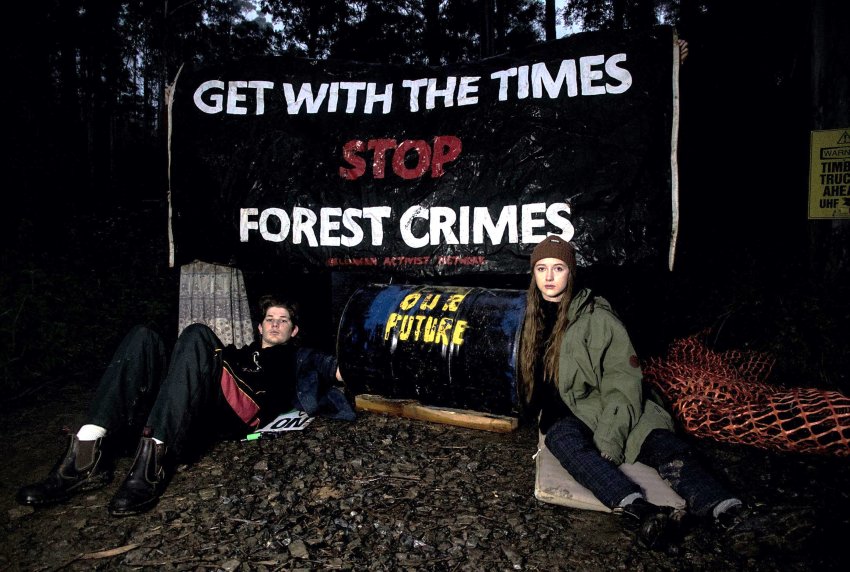
Despite a promise to create the Great Koala National Park (GKNP), New South Wales Labor has done nothing to stop logging in the area.
The NSW Forestry Corporation is planning to clear fell 30,813 hectares of the proposed GKNP — almost 18% in the next 12 months. Labor is ignoring calls to end native forest logging, while also covering for the industry’s financial losses.
Renew Economy (RE) reported that NSW Forestry Corporation ran a $6 million loss in 2021 and a $9 million loss in 2022.
Jacqui Mumford, Nature Conservation Council CEO, said on June 22 that $29 million has been spent “subsidising” the Forestry Corporation over the past two years. “Ending native forest logging and focusing on the profitable plantation sector would save taxpayers, our precious forests, and put Forestry Corporation on a path to sustainable operations.”
Mumford said transitioning out of logging would provide “significant financial opportunities” including in the creation of carbon credits, tourism and recreation. “The industry generates 3.6 million tonnes of carbon annually in NSW, which has been valued at $2.7 billion worth of climate mitigation action by 2050.”
Greens environment spokesperson Sue Higginson told The Guardian on May 25 that the logging industry lost $30 million over the past two years, if the $80 million fire and floods subsidy was taken in account. “In terms of the economics, it’s unfathomable that we’re still logging at this point of time.”
The Tree Projects assessed that native forests could provide carbon sequestration services equivalent to $2.7 billion from now until 2050. It argues that NSW has a “vast forest estate” which, if protected, could help fight climate change.
Yet, native forests are being irreparably damaged — removing valuable carbon sinks and destroying biodiversity — without any real economic benefit.
A March report commissioned by World Wide Fund for Nature (WWF) Australia found that the industry adjustment cost, including transitioning workers, would be $302 million.
It said Victoria and Western Australia had made commitments to transition out of native forest logging, and that NSW must commit to do the same. NSW is the second largest producer of native forest logs in Australia.
“Such a transition would support various NSW government initiatives: cutting emissions by 50% by 2030, doubling koala numbers by 2050, hand-back of lands to Indigenous communities, growth in nature-based tourism in the regions, increasing supply of low-carbon housing construction materials in the long-term, reducing plastic pollution, and protecting and enhancing natural capital,” were among the positives cited by the report.
But the problems with native forest logging go beyond the unviable economics: the injustice of the destruction of First Nations country and the levelling of crucial habitat for koalas; as well as the leaving behind landscapes of destruction and waste are some more.
Dr Jen Sanger, an ecologist with The Tree Projects, said most logged wood is used up within two years. “People imagine that when a forest gets logged, the trees get turned into wood and that lasts for ages. But, depending on the state, only about 6 per cent is stored in wood products.
“About 60 per cent of the biomass is left behind … of the biomass that is removed, the majority goes to woodchips which are turned into paper and pulp.”
According to RE, 6% ends up as timber, 24% as paper products, 10% as mill waste, 30% is burnt and 30% is left as debris on site.
Michael West Media reported on June 7 that federal environment minister Tanya Plibersek had removed the “Koala Referral Guidelines” in her Nature Repair Market Bill, replacing it with voluntary, self-referral guidelines. The Green Institute, an Australian Greens think tank, described the bill a “plan for distract, displacement and rorts that will do nothing to protect, let alone repair, the natural world”.
Bleaker still, NSW Labor on June 30 delayed funding for mandatory monitoring of the Forestry Corporation by removing the independent overseer.
Victoria and Western Australia have decided to end native forest logging by next year. NSW could do the same. Research by the Biodiversity Council found that 70% support banning native forest logging.
Meanwhile, activists are putting their bodies on the line to stop logging. Bellingen Activist Network said more people want to take direct action to protect forests.
On July 4, protesters, including high school students, locked themselves on to cement-filled barrels in Orara East State Forest and Boambee State Forest. Another student locked themselves onto logging machinery; two grandmothers locked themselves to the arm of a harvester; and a tree climber began a tree-sit.
April, one of the locked-on students in the Orara East State Forest said she “refuse[s] to stand idly by as Forestry Corp destroys the cherished memories I associate with it. It’s high time the NSW government recognises the urgent need to halt deforestation of native habitats and protect the natural treasures on Gumbaynggirr land”.
The tree-sitter at Boambee State Forest said: “I’m tired of this country being run as a corporation extracting every resource possible.”
WWF Australia, said the forestry-to-plantations transition in NSW is “inevitable, necessary, and overdue”. It said such transition would support various government initiatives, including cutting emissions by 50% by 2030 and doubling koala numbers by 2050.